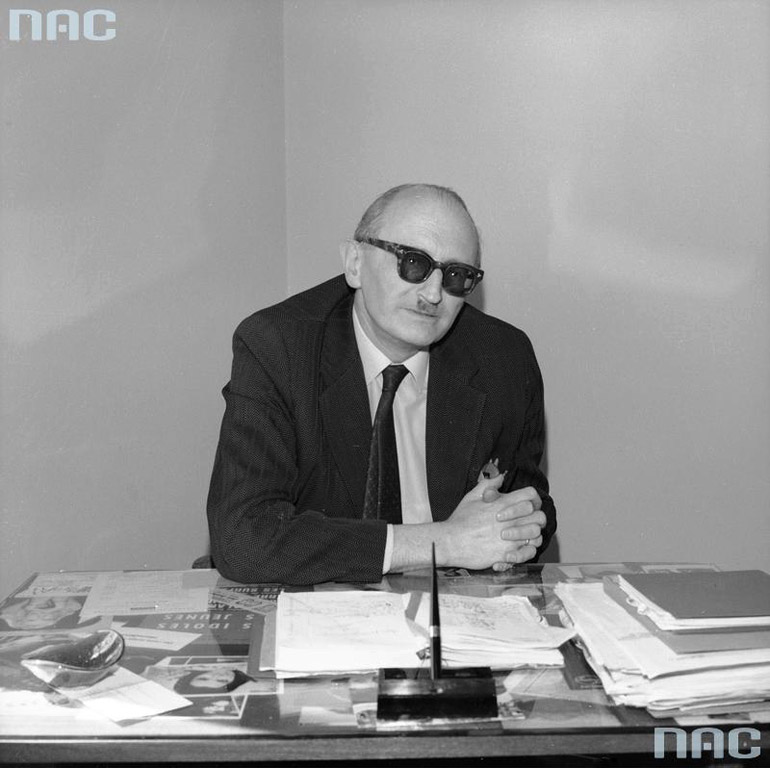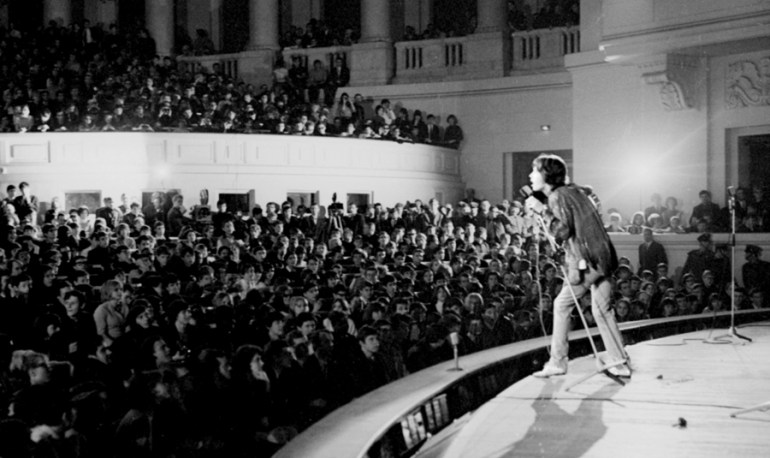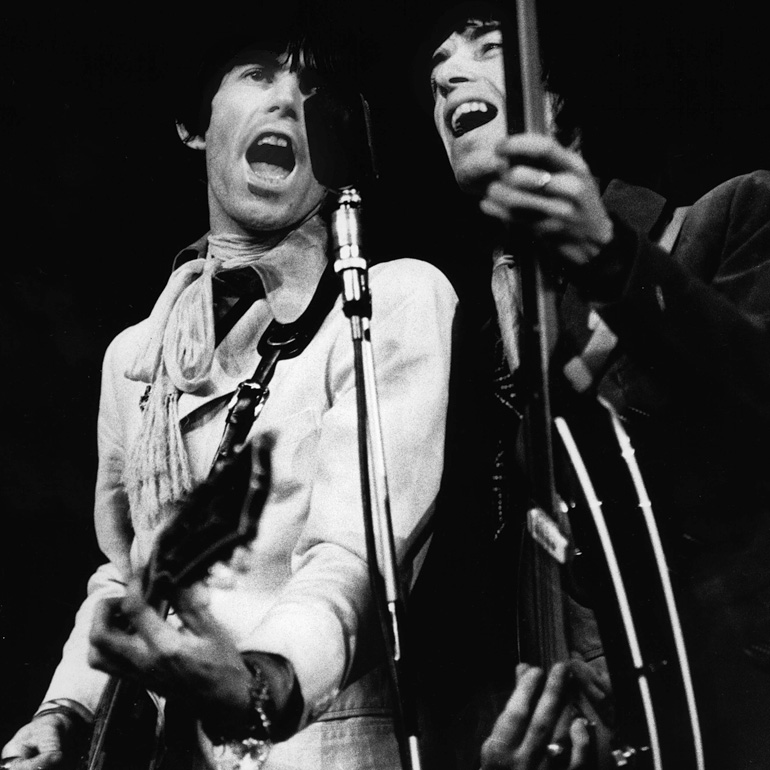If you were a Communist party leader, trying to isolate your people from the moral decay of Western civilization, would you invite a notorious rock band, not only involved in sex and drugs scandals but also willing to take on political matters, to perform in your capital? Not the most obvious thing to do, right? Therefore, how is it that in 1967 – the middle of the Cold War – Mick, Keith, Brian, Bill, and Charlie came to Poland and performed in Warsaw, at a huge hall known for being traditionally used for the Communist Party’s plenary congresses?
There is no easy answer to this question and since numerous myths have grown surrounding this event, let’s do some fact checking before we go any further.
Click the image below to check out our podcast about the Stones' visit to Warsaw.

The Rolling Stones’ European Tour in 1967
In 1967, the Rolling Stones hit the road to promote their Between the Buttons album. As a band notorious for breaking laws, rules, boundaries, and customs, they started toying with the idea of performing in Moscow and becoming the most controversial rock band to play on the other side of the Iron Curtain. Preliminary arrangements were even made but eventually (and obviously) the authorities didn’t allow it to happen. As a result, there was a 4-day gap in their tour schedule and The Rolling Stones’ management started working on relocating the performance somewhere else.
Meanwhile, several months earlier in Poland, two of the most promising, young journalists of the Polish Radio were asked to present themselves at an ‘audience’ with Władysław Jakubowski, the deputy director of Pagart. What was Pagart? Wojciech Mann, one of those journalists, wrote of it in his book1:
Pagart was an almighty, omnipotent institution and a true monopolist. Without Pagart no one could go abroad. Likewise, no one from abroad could perform in Poland without its participation.
Indeed, Pagart was the only way in and out of Poland for musicians; a monopolist, state-owned, concert agency. Mann described the reason he was asked to see Jakubowski:
Director Jakubowski looked at us through his massively thick glasses and asked: boys, write me down who would you like me to bring over to Poland (…) I started scribbling boldly from the Beatles and continued with the rest of our idols: The Rolling Stones, The Animals, The Hollies, Gerry and the Pacemakers, Lulu and Billy J.Kramer. Director Jakubowski glanced at our doodles and hid the sheet of paper in his drawer. The audience was over.
Deputy director Wiesław Jakubowski was a highly controversial person. On one hand he ran Pagart, a dysfunctional and corrupt organisation, on the other, he was the only person who had enough passion and contacts to even consider inviting international music stars. To say the least, even if the list Mann gave him seemed out of mind (even to Mann), sooner or later he managed to book every band on it, with the Beatles being the only exception. Impressing, even if sometimes he was just a bit lucky…
… because the idea of The Rolling Stones’ concert in Moscow eventually collapsed. However, the band didn’t give up the idea of playing in one of the countries of the Eastern Bloc. Bill Wyman wrote in his diary that back in 1967 the Iron Curtain was still very firm. The idea of a decadent Western band performing inside the Eastern Bloc was going way beyond what people believed was possible. Moreover, he claims that the idea was entirely theirs, that the fee the Polish organiser offered was pitiful and the only thing that pushed them beyond the Curtain was rumours of their underground popularity and ‘their will to crash the borders between the East and the West’, years before ‘glasnost’ came to life.
 Władysław Jakubowski, director of Pagart, photo: www.audiovis.nac.gov.pl (NAC)
Władysław Jakubowski, director of Pagart, photo: www.audiovis.nac.gov.pl (NAC)Jakubowski somehow managed to acquire the acceptance needed for the show to happen in Warsaw and jumped to the occasion. How exactly did he achieve it? Whose accord did he have to secure? Did he know precisely who was he dealing with? Why did he want it to happen, given that the band was already infamous for provoking riots, burning concert halls, and getting into all kind of trouble? Did he feel safe, just because prior concerts by the Animals and Hollies organised by Pagart had gone smoothly, with no serious buzz or violence?
The only thing we know for sure is that he must have heard about The Rolling Stones’ wrecking of the Olympia, the most famous concert hall in Paris. He was a close friend of Bruno Coquatrix, its director. The rest of these questions will remain unanswered forever, as Jakubowski died in 1992, at the age of 73, leaving no account of this story.
Nevertheless, in the beginning of April 1967, the utterly astonished inhabitants of Warsaw were stopping by posters announcing a concert by The Rolling Stones.
Wiesław Weiss, a music journalist, said in an interview for the Polish Radio:
Two weeks before the concert I was walking to the swimming pool with my friends and we spotted a poster on a pillar, a very brief one: The Rolling Stones, Congress Hall, 13 April 1967. It was in the beginning of April, and because the poster was very small and unattractive, we were absolutely convinced that someone simply wanted to play an April Fools’ prank.
The Rolling Stones land in Warsaw
 The Rolling Stones performing at Sala Kongresowa of the Palace of Culture and Science, 1967, photo: Wojciech Drushch / Reporter
The Rolling Stones performing at Sala Kongresowa of the Palace of Culture and Science, 1967, photo: Wojciech Drushch / ReporterBut a joke, it was not. Wojciech Mann, wrote of the level of ideological chasm between the communist regime’s cultural policy and the planned Rolling Stones show:
The scale of this event, back in the reality of Poland ruled by Gomułka, is hard to understand nowadays. It’s a bit as if today, aliens from another galaxy landed on the central square in Warsaw and announced that the city has been elected to become the universe’s capitol.
In fact, the aliens landed – on April 12, The Rolling Stones arrived in Warsaw. Bill Wyman didn’t immediately fall in love in Warsaw. He recalled the airport looking like an army barracks and described the city as ‘gloomy, grey and overwhelmingly depressing’. In addition to that, he had the feeling of being closely watched by the secret police and says that the band’s attempt to take a walk around Warsaw was aborted by agents.
Meanwhile, on April 13th, a huge crowd started gathering around Congress Hall. Thousands of people wanted to get tickets, but the lion’s share of it had been already distributed for free among communist party members and their families. Nonetheless masses of people came to the doors of the concert hall, counting on a bit of luck.
A concert in Congress Hall, a riot outside Congress Hall
The Rolling Stones drove from the Hotel Europejski to Congress Hall, escorted by numerous police units, which indicates that at least on the day of the show, the regime was conscious of the risk their presence raised. Indeed, the unrest in front of Congress Hall was already alarming. Not only were there almost no tickets available for purchase but also a few conmen were selling fake tickets for big money. Those who found out that they had been cheated started frantically looking for the cheaters… The Common Word journal reported:
Despite Warsaw Police being joined by additional units, the situation was becoming more and more tense. Scuffles and brawls were shaking the crowd of teenagers desperately trying to get into the concert hall without tickets. Police was forced to use truncheons to restore order.
Eventually, because of all this turmoil, Congress Hall with its capacity of around 2700 was drastically overcrowded. People were standing in the passages, between the rows, squeezing on balconies. Police managed to push the crowd to the back, leaving the front rows filled with the communist party members only. The concert finally started. Tom Keylock, The Stones’ driver and official ‘fixer’ recalls his impression2:
I looked down and all you could see was row after row of men, women and kids all dressed in grey, sitting there with their fingers in their ears.
Meanwhile on the back of the hall, true fans started pushing forward and dancing wildly, recklessly swinging their jackets around. The roar of excitement was so loud that it almost managed to cover the usually deafening music of The Rolling Stones. The situation was getting out of control despite continued efforts from the police units. Keith Richards, frustrated by the front rows not taking part in the musical trance and being guarded by officers, used his microphone to shout3:
You fucking lot! You can fucking get out and let the bastards in the back down front!
At some point Jagger ate, chewed and spat out a bucket of little flowers thrown to the stage by a fan. He constantly made obscene gestures towards the police cordon and people sitting in the front row, covering their ears, trying to protect their hearing from being damaged by The Rolling Stones’ wall of sound. Behaviour such as Mick’s was unheard of at that time and brought a taste of freedom that turned the vast majority of the crowd red hot.
If the situation inside the hall was difficult, outside it turned into a regular battle between the crowd and the police. In a police state where vandalism was severely persecuted and almost non-existent, people started throwing objects, damaging cars, and breaking windows and street lamps. Police added dogs, water guns, and tear gas to their arsenal and started to brutally disperse the protesters.
Afterparty and aftermath
 Warszawa, 13.04.1967 , concert by The Rolling Stones, Congress Hall, Warsaw, photo: Marek A. Karewicz/Forum
Warszawa, 13.04.1967 , concert by The Rolling Stones, Congress Hall, Warsaw, photo: Marek A. Karewicz/ForumWhile leaving Congress Hall, The Rolling Stones saw what was happening in front and according to Bill Wyman’s diary they decided to react. The Rolling Stones’ bassist claims that they felt so bad that they ordered a van immediately after returning to the hotel, took several boxes of their albums and took a trip around the city, throwing records out of the window every time they spotted a group of youths, by this means handing out over 100 discs.
This account doesn’t seem to be entirely true (even the band’s press agent gives a different version) but it seems that The Stones were truly shaken by what happened in front of their eyes. Wyman concludes that on leaving Poland they were well aware that their adventure was a massive success ‘culture-wise’, which made them proud and satisfied, but at the same time they couldn’t shake how people were oppressed by the state.
The communist press didn’t spare a lot of space for this event, and mostly concentrated on what happened outside of the concert hall. The Warsaw Courier reported on the next day, in an article titled Was It a Hurricane That Hit Warsaw Yesterday? No, It Was The Rolling Stones!
The arrival of the British rock band The Rolling Stones met with great interest among Warsaw teenagers. However, youth’s curiosity, apparently influenced by a few hundred notorious rowdies, turned into relentless aggression bordering on wild vandalism.
On April 14th, The Rolling Stones checked out of the Europejski Hotel and departed for Zurich to play the next concert of their tour.
How did this actually happen?
Answering the question of why the communist Polish authorities allowed The Rolling Stones to rock Warsaw remains extraordinarily difficult to answer. Even if Pagart’s deputy director Jakubowski was as ignorant about rock 'n' roll as he was knowledgeable on classical music, it seems absolutely impossible that he had not been warned of the band’s infamous propensity to unleash people’s excessive excitement, and probably at a very early stage on negotiations. He had too many friends in the music business abroad.
However, from the documents and memories of people involved it appears that there was no surprise on either side of the contract. The band knew where they were coming and probably did it purely for public relations purposes. It was very in-line with the strategy that their press agent Les Perrin had adopted; forming the image of the most shocking, aggressive, unpredictable, and liberated band. The other side – the communist regime probably planned to use this concert as a tactic of their own. Grzegorz Wasowski explained that4:
The authorities, as dumb as they were, knew that if they couldn’t offer freedom to its citizens, they at least had to offer ersatz, meaning ‘circuses’.
What Grzegorz Wasowski described is broadly known as the 'safety valve theory'. Instead of overt political and cultural freedom, the communist regime would organise huge events once in a blue moon, sometimes the kind that were contradictory to what they preached on a daily basis. These ‘circuses’ were intended to make the youth blow off some steam, give them a pinch of freedom, and, hey presto, prevent them from openly protesting against their government.
Allowing a scandalous band to perform in the country’s capital was also a great counter-argument against those who postulated abolishing censorship and liberalising the cultural policy. In the end, for many years the Polish communist regime was the only country to allow them to play, giving the illusion of being more open than others. Finally, they probably thought that they would be able to control the situation.
That blatant underestimation of the power of rock 'n' roll resulted in a half-day riot and did more harm than good to the communist propaganda. Soviet representatives, present at the concert, banned The Rolling Stones from performing in the Soviet Union ever again and published a statement discouraging other Eastern Bloc republics from inviting them.
The Rolling Stones returned to Poland only after the communist regime had fallen – the first time was in 1998, 31 years after that fateful debut, and they have since played another three times. Ultimately, their 1967 appearance in Poland earned them a unique place in Polish music fans’ hearts, making all of their subsequent concerts here special too.